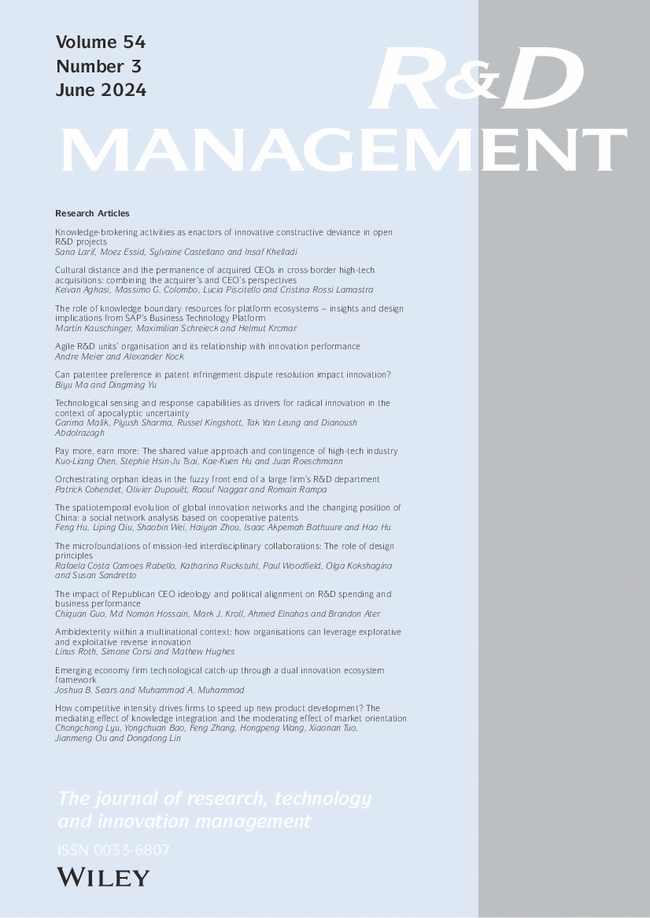Rapid setup and management of medical device design and manufacturing consortia: experiences from the COVID‐19 crisis in the UK
IF 5.7
2区 管理学
Q1 BUSINESS
引用次数: 10
Abstract
The COVID‐19 pandemic caused severe ventilator shortages in many healthcare systems worldwide. The UK government reacted to this with a three‐pronged approach of importing, up‐scaling existing production and supporting new design projects. The latter two parts – labelled the UK Ventilator Challenge – included over 50 companies from various sectors including the automotive and aerospace industries. Nine multi‐partner consortia and five single‐company projects were initiated with varying approaches. This study explores lessons learned during the setup and management of these medical device designs and manufacturing consortia. A qualitative survey methodology was employed, and 32 semi‐structured stakeholder interviews were conducted. The primary data was triangulated through the collection of 42 secondary data sources such as webinars and radio interviews. Transcription and a three‐step data analysis process of thematic coding identified six lessons learned. The analysis of the data showed that a strong, appealing common goal can enable employee motivation and trust as well as align priorities across all companies involved. This facilitates the involvement and fruitful collaboration of companies with varying sizes and fields of expertise. Furthermore, selecting the most suitable employees with specialist knowledge for high‐priority projects and empowering them to make decisions can have a positive effect on project performance. The findings from the study complement existing literature on new product development and crisis management processes. In addition, the results uncover potential long‐term effects such as more openness for cross‐sector collaborations, which can serve as interesting sources for further research.医疗器械设计和制造联盟的快速建立和管理:来自英国COVID - 19危机的经验
COVID - 19大流行在全球许多医疗保健系统造成了严重的呼吸机短缺。对此,英国政府采取了三管齐下的措施,包括进口、扩大现有生产规模和支持新的设计项目。后两个部分被称为“英国呼吸机挑战赛”,来自汽车和航空航天等不同行业的50多家公司参加了比赛。9个多合作伙伴联盟和5个单一公司项目以不同的方式启动。本研究探讨在建立和管理这些医疗器械设计和制造联盟的经验教训。采用了定性调查方法,并进行了32次半结构化的利益相关者访谈。主要数据通过收集42个辅助数据源(如网络研讨会和电台采访)进行三角测量。转录和三步数据分析过程的主题编码确定了六个经验教训。对数据的分析表明,一个强有力的、有吸引力的共同目标可以激发员工的动力和信任,并使所有相关公司的优先事项保持一致。这促进了不同规模和专业领域的公司的参与和富有成效的合作。此外,为高优先级项目选择最合适的具有专业知识的员工,并授权他们做出决策,可以对项目绩效产生积极影响。研究结果补充了现有的关于新产品开发和危机管理过程的文献。此外,研究结果还揭示了潜在的长期影响,如跨部门合作更加开放,这可以作为进一步研究的有趣来源。
本文章由计算机程序翻译,如有差异,请以英文原文为准。
求助全文
约1分钟内获得全文
求助全文
来源期刊

R&D Management
Multiple-
CiteScore
11.30
自引率
9.50%
发文量
0
期刊介绍:
R&D Management journal publishes articles which address the interests of both practising managers and academic researchers in research and development and innovation management. Covering the full range of topics in research, development, design and innovation, and related strategic and human resource issues - from exploratory science to commercial exploitation - articles also examine social, economic and environmental implications.
 求助内容:
求助内容: 应助结果提醒方式:
应助结果提醒方式:


